初中英语听力常考的30组英语对话!太全了!
- 格式:pdf
- 大小:801.06 KB
- 文档页数:23
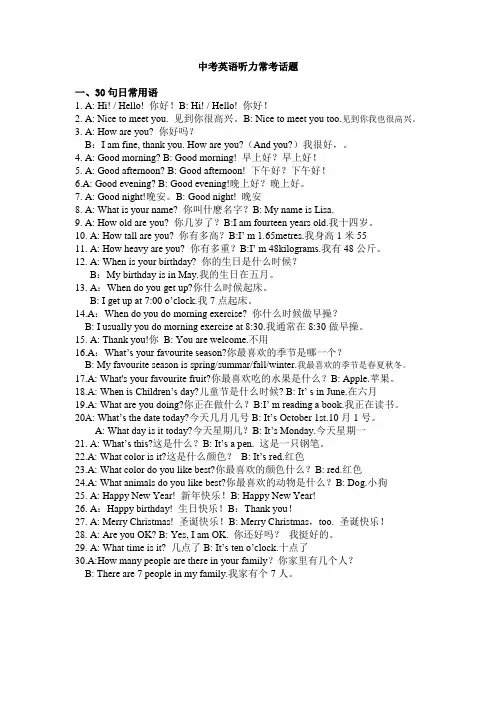
中考英语听力常考话题一、30句日常用语1. A: Hi! / Hello! 你好!B: Hi! / Hello! 你好!2. A: Nice to meet you. 见到你很高兴。
B: Nice to meet you too.见到你我也很高兴。
3. A: How are you? 你好吗?B:I am fine, thank you. How are you?(And you?)我很好,。
4. A: Good morning? B: Good morning! 早上好?早上好!5. A: Good afternoon? B: Good afternoon! 下午好?下午好!6.A: Good evening? B: Good evening!晚上好?晚上好。
7. A: Good night!晚安。
B: Good night! 晚安8. A: What is your name? 你叫什麽名字?B: My name is Lisa.9. A: How old are you? 你几岁了?B:I am fourteen years old.我十四岁。
10. A: How tall are you? 你有多高?B:I’ m 1.65metres.我身高1米5511. A: How heavy are you? 你有多重?B:I’ m 48kilograms.我有48公斤。
12. A: When is your birthday? 你的生日是什么时候?B:My birthday is in May.我的生日在五月。
13. A:When do you get up?你什么时候起床。
B: I g et up at 7:00 o’clock.我7点起床。
14.A:When do you do morning exercise? 你什么时候做早操?B: I usually you do morning exercise at 8:30.我通常在8:30做早操。
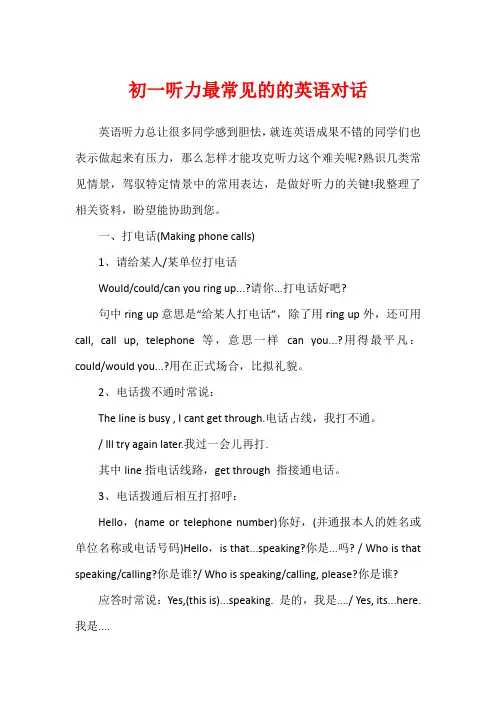
初一听力最常见的的英语对话英语听力总让很多同学感到胆怯,就连英语成果不错的同学们也表示做起来有压力,那么怎样才能攻克听力这个难关呢?熟识几类常见情景,驾驭特定情景中的常用表达,是做好听力的关键!我整理了相关资料,盼望能协助到您。
一、打电话(Making phone calls)1、请给某人/某单位打电话Would/could/can you ring up...?请你...打电话好吧?句中ring up意思是“给某人打电话”,除了用ring up外,还可用call, call up, telephone 等,意思一样can you...?用得最平凡:could/would you...?用在正式场合,比拟礼貌。
2、电话拨不通时常说:The line is busy , I cant get through.电话占线,我打不通。
/ Ill try again later.我过一会儿再打.其中line指电话线路,get through 指接通电话。
3、电话拨通后相互打招呼:Hello,(name or telephone number)你好,(并通报本人的姓名或单位名称或电话号码)Hello,is that...speaking?你是...吗? / Who is that speaking/calling?你是谁?/ Who is speaking/calling, please?你是谁?应答时常说:Yes,(this is)...speaking. 是的,我是..../ Yes, its...here. 我是....4、打电话请对方找人或留言:Is...in/at home? 某某在家吗?/ Can/may/could I speak to..., please?请...接电话好吗?/ Will/would you give a message to..., please?请给...捎个口信好吗? / Would you tell him my telephone number, please? 请你把我的电话号码告知他好吗?/ Can/could you ask...to ring me back, please?请叫...给我回个电话好吗?应答时常说:Hold on/Wait a minute/One moment, please. 请等一等/ Im sorry...is not in./at home now.对不起,...此时此刻不在/ Can I take a message? 我能给你捎口信好吗?/ Does he have your telephone number?他有你的电话号码吗?/ Ill ask him to call you back. 我叫他给你回电话二、劝导和建议(Advice and suggestion)1、Youd better (not)do sth... 你最好(不)干..../ You should do sth. 你应当干..../ You need(to)do sth. 你须要干....2、Why dont you do sth? 为什么不..../ Why not do sth? 为什么不....这是以反问的方式提出劝导或建议,含有建议对方去干某事的意思,而不是询问对方为何不去干某事的缘由.3、What/How about +名词或动名词...? 这种句型表达随意的建议,有征求对方看法的意思,多数状况下是建议和对方一起做某事。
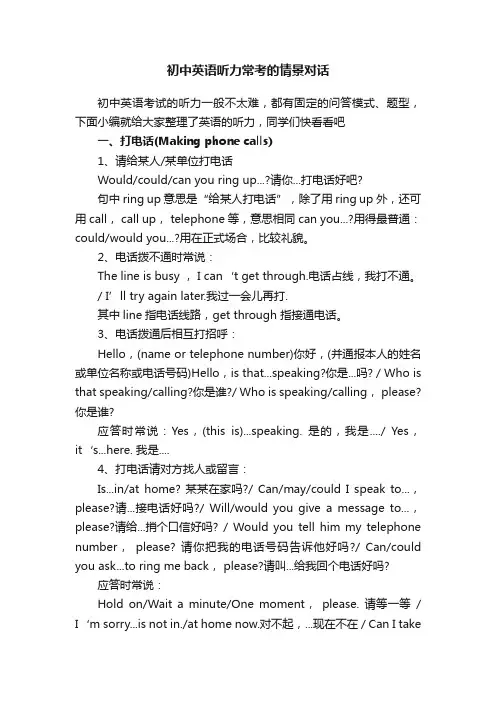
初中英语听力常考的情景对话初中英语考试的听力一般不太难,都有固定的问答模式、题型,下面小编就给大家整理了英语的听力,同学们快看看吧一、打电话(Making phone calls)1、请给某人/某单位打电话Would/could/can you ring up...?请你...打电话好吧?句中ring up意思是“给某人打电话”,除了用ring up外,还可用call, call up, telephone 等,意思相同 can you...?用得最普通:could/would you...?用在正式场合,比较礼貌。
2、电话拨不通时常说:The line is busy ,I can‘t get through.电话占线,我打不通。
/ I’ll try again later.我过一会儿再打.其中line指电话线路,get through 指接通电话。
3、电话拨通后相互打招呼:Hello,(name or telephone number)你好,(并通报本人的姓名或单位名称或电话号码)Hello,is that...speaking?你是...吗? / Who is that speaking/calling?你是谁?/ Who is speaking/calling, please?你是谁?应答时常说:Yes,(this is)...speaking. 是的,我是..../ Yes,it‘s...here. 我是....4、打电话请对方找人或留言:Is...in/at home? 某某在家吗?/ Can/may/could I speak to...,please?请...接电话好吗?/ Will/would you give a message to...,please?请给...捎个口信好吗? / Would you tell him my telephone number,please? 请你把我的电话号码告诉他好吗?/ Can/could you ask...to ring me back, please?请叫...给我回个电话好吗?应答时常说:Hold on/Wait a minute/One moment,please. 请等一等/ I‘m sorry...is not in./at home now.对不起,...现在不在 / Can I takea message? 我能给你捎口信好吗?/ Does he have your telephone number?他有你的电话号码吗?/ I’ll ask him to call you back. 我叫他给你回电话二、劝告和建议(Advice and suggestion)1、You‘d better (not)do sth... 你(不)干..../ You should do sth. 你应该干..../ You need(to)do sth. 你需要干....2、Why don‘t you do sth? 为什么不..../ Why not do sth? 为什么不....这是以反问的方式提出劝告或建议,含有建议对方去干某事的意思,而不是询问对方为何不去干某事的原因.3、What/How about +名词或动名词...? 这种句型表达随便的建议,有征求对方意见的意思,多数情况下是建议和对方一起做某事。
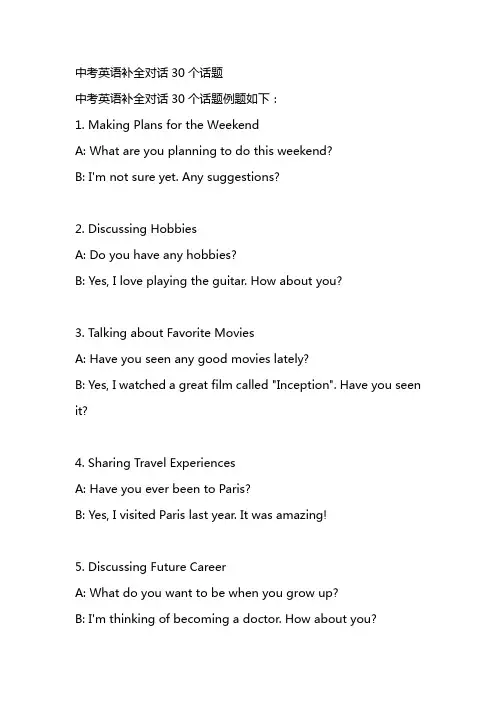
中考英语补全对话30个话题中考英语补全对话30个话题例题如下:1. Making Plans for the WeekendA: What are you planning to do this weekend?B: I'm not sure yet. Any suggestions?2. Discussing HobbiesA: Do you have any hobbies?B: Yes, I love playing the guitar. How about you?3. Talking about Favorite MoviesA: Have you seen any good movies lately?B: Yes, I watched a great film called "Inception". Have you seen it?4. Sharing Travel ExperiencesA: Have you ever been to Paris?B: Yes, I visited Paris last year. It was amazing!5. Discussing Future CareerA: What do you want to be when you grow up?B: I'm thinking of becoming a doctor. How about you?6. Talking about School LifeA: How do you like your new school?B: I really enjoy it. The teachers are nice, and the subjects are interesting.7. Talking about Favorite SportsA: Do you play any sports?B: Yes, I play basketball. It's my favorite sport.8. Discussing Music PreferencesA: What kind of music do you like?B: I enjoy listening to pop and rock music. How about you?9. Talking about Favorite BooksA: Have you read any good books recently?B: Yes, I just finished reading "The Hunger Games". It was captivating!10. Discussing Food and CuisineA: What's your favorite type of food?B: I love Italian cuisine. Pasta and pizza are my favorites.11. T alking about FamilyA: How many siblings do you have?B: I have one older brother and one younger sister.12. Discussing Future PlansA: What are your plans after graduation?B: I'm considering going to university and studying engineering.13. T alking about TechnologyA: Do you enjoy using social media?B: Yes, I use Instagram and Snapchat to connect with my friends.14. Discussing Environmental IssuesA: Are you concerned about climate change?B: Yes, I think it's important for everyone to take action to protect the environment.15. T alking about Favorite TV ShowsA: Do you have a favorite TV show?B: Yes, I love watching "Friends". It always makes me laugh.16. Discussing Cultural DifferencesA: Have you ever traveled to a different country?B: Yes, I visited Japan and found their culture fascinating.17. T alking about Health and FitnessA: Do you exercise regularly?B: Yes, I go for a run every morning to stay fit.18. Discussing Technology in EducationA: What do you think about using computers in the classroom?B: I think it's beneficial as it enhances learning and makes it more interactive.19. T alking about Personal AchievementsA: Have you ever won any awards?B: Yes, I received an award for academic excellence last year.20. Discussing Volunteer WorkA: Have you ever done any volunteer work?B: Yes, I volunteered at a local animal shelter during my summer break.21. T alking about Cultural EventsA: Are you planning to attend any cultural events?B: Yes, I'm excited to go to the music festival next month.22. Discussing Role ModelsA: Who is your role model?B: My role model is my mom. She is hardworking and compassionate.23. T alking about Dreams and AspirationsA: What is your biggest dream in life?B: My dream is to travel around the world and experience different cultures.24. Discussing Time ManagementA: How do you manage your time effectively?B: I use a planner and prioritize my tasks to stay organized.25. T alking about Personal ChallengesA: Have you ever faced any challenges in your life?B: Yes, I had to overcome my fear of public speaking.26. Discussing Favorite SubjectsA: What is your favorite subject in school?B: I really enjoy studying English. It's fascinating to learn about different authors.27. Talking about Role ReversalA: If you could be anyone else for a day, who would you be? B: I would love to be a professional athlete and experience their life.28. Discussing Cultural TraditionsA: What are some cultural traditions in your country?B: In my country, we celebrate Lunar New Year with family gatherings and special meals.29. T alking about Personal StrengthsA: What do you consider to be your greatest strength?B: I believe my greatest strength is my determination and perseverance.30. Discussing Future Travel PlansA: Do you have any travel plans for the future?B: Yes, I'm planning to visit Thailand next year for a beach vacation.。
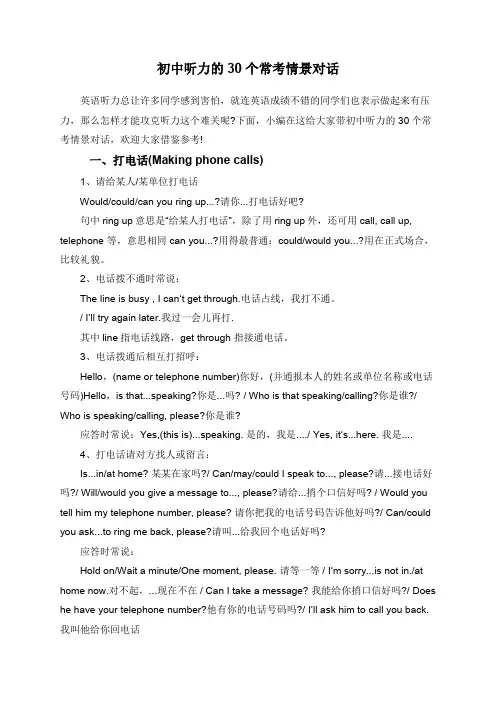
初中听力的30个常考情景对话英语听力总让许多同学感到害怕,就连英语成绩不错的同学们也表示做起来有压力,那么怎样才能攻克听力这个难关呢?下面,小编在这给大家带初中听力的30个常考情景对话,欢迎大家借鉴参考!一、打电话(Making phone calls)1、请给某人/某单位打电话Would/could/can you ring up...?请你...打电话好吧?句中ring up意思是“给某人打电话”,除了用ring up外,还可用call, call up, telephone 等,意思相同 can you...?用得最普通:could/would you...?用在正式场合,比较礼貌。
2、电话拨不通时常说:The line is busy , I can‘t get through.电话占线,我打不通。
/ I’ll try again later.我过一会儿再打.其中line指电话线路,get through 指接通电话。
3、电话拨通后相互打招呼:Hello,(name or telephone number)你好,(并通报本人的姓名或单位名称或电话号码)Hello,is that...speaking?你是...吗? / Who is that speaking/calling?你是谁?/ Who is speaking/calling, please?你是谁?应答时常说:Yes,(this is)...speaking. 是的,我是..../ Yes, it‘s...here. 我是....4、打电话请对方找人或留言:Is...in/at home? 某某在家吗?/ Can/may/could I speak to..., please?请...接电话好吗?/ Will/would you give a message to..., please?请给...捎个口信好吗? / Would you tell him my telephone number, please? 请你把我的电话号码告诉他好吗?/ Can/could you ask...to ring me back, please?请叫...给我回个电话好吗?应答时常说:Hold on/Wait a minute/One moment, please. 请等一等/ I‘m sorry...is not in./at home now.对不起,...现在不在 / Can I take a message? 我能给你捎口信好吗?/ Does he have your telephone number?他有你的电话号码吗?/ I’ll ask him to call you back. 我叫他给你回电话二、劝告和建议(Advice and suggestion)1、You‘d better (not)do sth... 你最好(不)干..../ You should do sth. 你应该干..../ You need(to)do sth. 你需要干....2、Why don‘t you do sth? 为什么不..../ Why not do sth? 为什么不....这是以反问的方式提出劝告或建议,含有建议对方去干某事的意思,而不是询问对方为何不去干某事的原因.3、What/How about +名词或动名词...? 这种句型表达随便的建议,有征求对方意见的意思,多数情况下是建议和对方一起做某事。
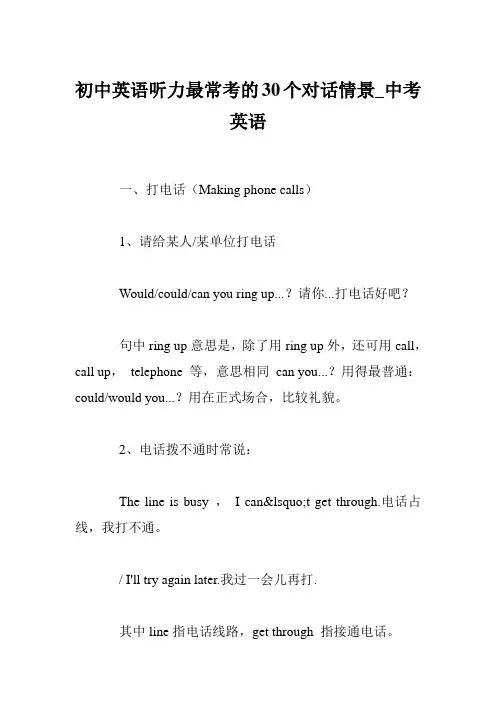
初中英语听力最常考的30个对话情景_中考英语一、打电话(Making phone calls)1、请给某人/某单位打电话Would/could/can you ring up...?请你...打电话好吧?句中ring up意思是,除了用ring up外,还可用call,call up,telephone 等,意思相同can you...?用得最普通:could/would you...?用在正式场合,比较礼貌。
2、电话拨不通时常说:The line is busy ,I can‘t get through.电话占线,我打不通。
/ I'll try again later.我过一会儿再打.其中line指电话线路,get through 指接通电话。
3、电话拨通后相互打招呼:Hello,(name or telephone number)你好,(并通报本人的姓名或单位名称或电话号码)Hello,is that...speaking?你是...吗?/ Who is that speaking/calling?你是谁?/ Who is speaking/calling,please?你是谁?应答时常说:Yes,(this is)...speaking. 是的,我是..../ Yes,it‘s...here. 我是....4、打电话请对方找人或留言:Is...in/at home?某某在家吗?/ Can/may/could I speak to...,please?请...接电话好吗?/ Will/would you give a message to...,please?请给...捎个口信好吗?/ Would you tell him my telephone number,please?请你把我的电话号码告诉他好吗?/ Can/could you ask...to ring me back,please?请叫...给我回个电话好吗?应答时常说:Hold on/Wait a minute/One moment,please. 请等一等/ I‘m sorry...is not in./at home now.对不起,...现在不在/ Can I take a message?我能给你捎口信好吗?/ Does he have your telephone number?他有你的电话号码吗?/ I'll ask him to call you back. 我叫他给你回电话二、劝告和建议(Advice and suggestion)1、You‘d better (not)do sth... 你最好(不)干..../ You should do sth. 你应该干..../ You need(to)do sth. 你需要干....2、Why don‘t you do sth?为什么不..../ Why not do sth?为什么不....这是以反问的方式提出劝告或建议,含有建议对方去干某事的意思,而不是询问对方为何不去干某事的原因.3、What/How about +名词或动名词...?这种句型表达随便的建议,有征求对方意见的意思,多数情况下是建议和对方一起做某事。
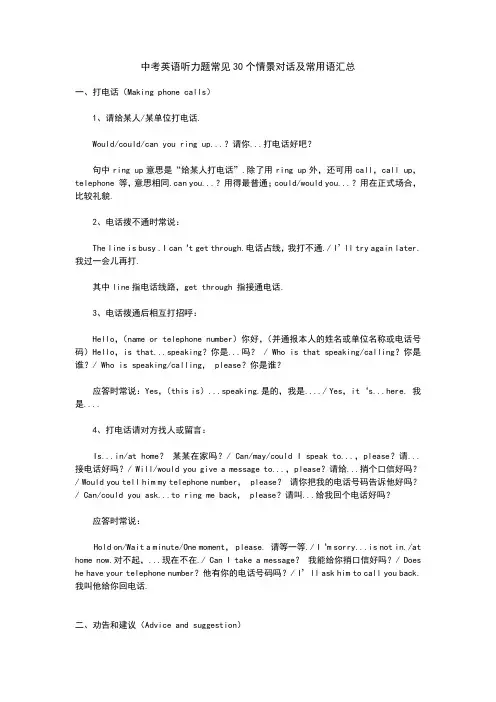
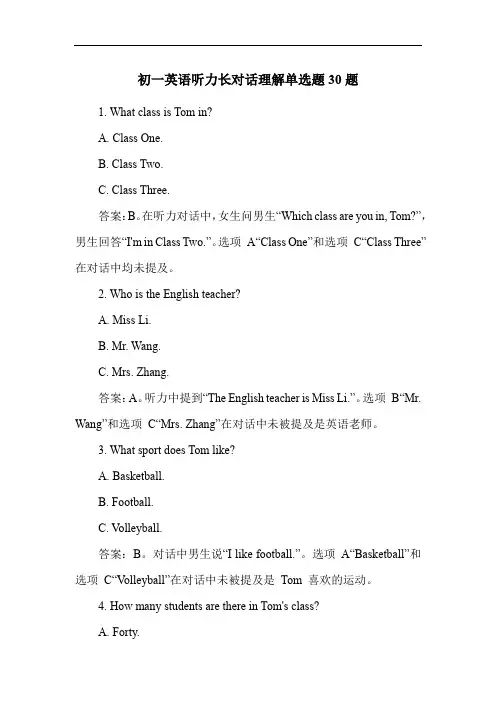
初一英语听力长对话理解单选题30题1. What class is Tom in?A. Class One.B. Class Two.C. Class Three.答案:B。
在听力对话中,女生问男生“Which class are you in, Tom?”,男生回答“I'm in Class Two.”。
选项A“Class One”和选项C“Class Three”在对话中均未提及。
2. Who is the English teacher?A. Miss Li.B. Mr. Wang.C. Mrs. Zhang.答案:A。
听力中提到“The English teacher is Miss Li.”。
选项B“Mr. Wang”和选项C“Mrs. Zhang”在对话中未被提及是英语老师。
3. What sport does Tom like?A. Basketball.B. Football.C. V olleyball.答案:B。
对话中男生说“I like football.”。
选项A“Basketball”和选项C“V olleyball”在对话中未被提及是Tom 喜欢的运动。
4. How many students are there in Tom's class?A. Forty.B. Forty-five.C. Fifty.答案:B。
听力中有“there are forty-five students in our class.”。
选项A“Forty”和选项C“Fifty”与对话中的学生数量不符。
5. What time does the first class start?A. At eight.B. At eight fifteen.C. At eight thirty.答案:A。
对话中提到“The first class starts at eight.”。
选项B“At eight fifteen”和选项C“At eight thirty”不是第一节课开始的时间。
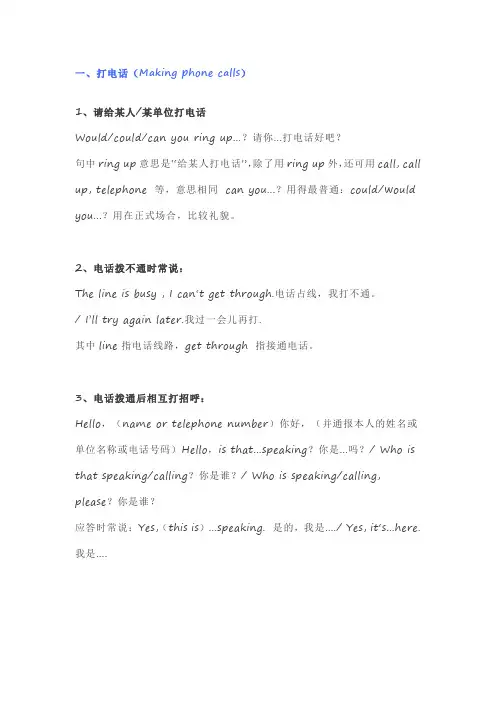
一、打电话(Making phone calls)1、请给某人/某单位打电话Would/could/can you ring up...?请你...打电话好吧?句中ring up意思是“给某人打电话”,除了用ring up外,还可用call, call up, telephone 等,意思相同can you...?用得最普通:could/would you...?用在正式场合,比较礼貌。
2、电话拨不通时常说:The line is busy , I can‘t get through.电话占线,我打不通。
/ I’ll try again later.我过一会儿再打.其中line指电话线路,get through 指接通电话。
3、电话拨通后相互打招呼:Hello,(name or telephone number)你好,(并通报本人的姓名或单位名称或电话号码)Hello,is that...speaking?你是...吗?/ Who is that speaking/calling?你是谁?/ Who is speaking/calling, please?你是谁?应答时常说:Yes,(this is)...speaking. 是的,我是..../ Yes, it‘s...here. 我是....4、打电话请对方找人或留言:Is...in/at home?某某在家吗?/ Can/may/could I speak to..., please?请...接电话好吗?/ Will/would you give a message to..., please?请给...捎个口信好吗?/ Would you tell him my telephone number, please?请你把我的电话号码告诉他好吗?/ Can/could you ask...to ring me back, please?请叫...给我回个电话好吗?应答时常说:Hold on/Wait a minute/One moment, please. 请等一等/ I‘m sorry...is not in./at home now.对不起,...现在不在/ Can I take a message?我能给你捎口信好吗?/ Does he have your telephone number?他有你的电话号码吗?/ I’ll ask him to call you back. 我叫他给你回电话二、劝告和建议(Advice and suggestion)1、You‘d better (not)do sth... 你最好(不)干..../ You should do sth. 你应该干..../ You need(to)do sth. 你需要干....2、Why don‘t you do sth?为什么不..../ Why not do sth?为什么不....这是以反问的方式提出劝告或建议,含有建议对方去干某事的意思,而不是询问对方为何不去干某事的原因.3、What/How about +名词或动名词...?这种句型表达随便的建议,有征求对方意见的意思,多数情况下是建议和对方一起做某事。
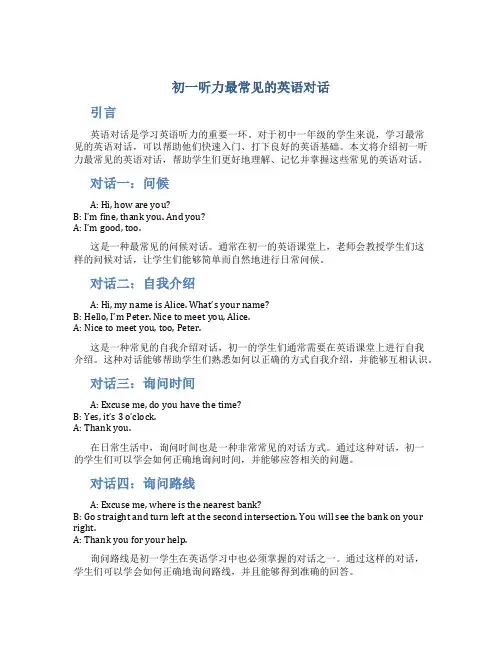
初一听力最常见的英语对话引言英语对话是学习英语听力的重要一环。
对于初中一年级的学生来说,学习最常见的英语对话,可以帮助他们快速入门、打下良好的英语基础。
本文将介绍初一听力最常见的英语对话,帮助学生们更好地理解、记忆并掌握这些常见的英语对话。
对话一:问候A: Hi, how are you?B: I’m fine, thank you. And you?A: I’m good, too.这是一种最常见的问候对话。
通常在初一的英语课堂上,老师会教授学生们这样的问候对话,让学生们能够简单而自然地进行日常问候。
对话二:自我介绍A: Hi, my name is Alice. What’s your name?B: Hello, I’m Peter. Nice to meet you, Alice.A: Nice to meet you, too, Peter.这是一种常见的自我介绍对话,初一的学生们通常需要在英语课堂上进行自我介绍。
这种对话能够帮助学生们熟悉如何以正确的方式自我介绍,并能够互相认识。
对话三:询问时间A: Excuse me, do you have the time?B: Yes, it’s 3 o’clock.A: Thank you.在日常生活中,询问时间也是一种非常常见的对话方式。
通过这种对话,初一的学生们可以学会如何正确地询问时间,并能够应答相关的问题。
对话四:询问路线A: Excuse me, where is the nearest bank?B: Go straight and turn left at the second intersection. You will see the bank on your right.A: Thank you for your help.询问路线是初一学生在英语学习中也必须掌握的对话之一。
通过这样的对话,学生们可以学会如何正确地询问路线,并且能够得到准确的回答。
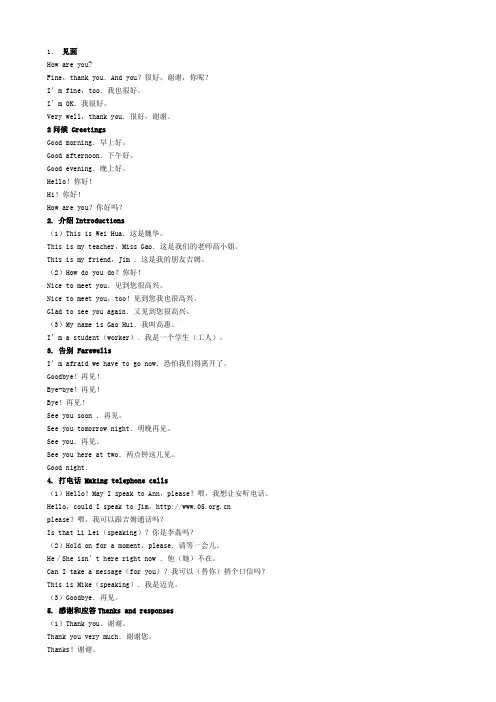
1.见面How are you?Fine,thank you.And you?很好,谢谢,你呢?I’m fine,too.我也很好。
I’m OK.我很好。
Very well,thank you.很好,谢谢。
2问候 GreetingsGood morning.早上好。
Good afternoon.下午好。
Good evening.晚上好。
Hello!你好!Hi!你好!How are you?你好吗?2. 介绍Introductions(1)This is Wei Hua.这是魏华。
This is my teacher,Miss Gao.这是我们的老师高小姐。
This is my friend,Jim .这是我的朋友吉姆。
(2)How do you do?你好!Nice to meet you.见到您很高兴。
Nice to meet you,too!见到您我也很高兴。
Glad to see you again.又见到您很高兴。
(3)My name is Gao Hui.我叫高惠。
I’m a student(worker).我是一个学生(工人)。
3. 告别 FarewellsI’m afraid we have to go now.恐怕我们得离开了。
Goodbye!再见!Bye-bye!再见!Bye!再见!See you soon .再见。
See you tomorrow night.明晚再见。
See you.再见。
See you here at two.两点钟这儿见。
Good night.4. 打电话 Making telephone calls(1)Hello!May I speak to Ann,please?喂,我想让安听电话。
Hello,could I speak to Jim,please?喂,我可以跟吉姆通话吗?Is that Li Lei(speaking)?你是李磊吗?(2)Hold on for a moment,please.请等一会儿。
初二英语听力长对话理解练习题30题1<背景文章>A: Hi! What are you going to do this weekend?B: I'm not sure yet. Maybe I'll go to the movies. What about you?A: I was thinking about going to the park. The weather is supposed to be nice.B: That sounds like a good idea. We could have a picnic there.A: Yeah, and we could also play some games.B: Or we could go to the library and study.A: Hmm, that's not a bad idea either. But I really want to do something outdoors.B: Well, how about we go to the park in the morning and then go to the movies in the afternoon?A: That sounds great! What movie do you want to see?B: I don't know. Let's check the movie listings online.1. What is one of the activities they discuss?A. Going shopping.B. Watching TV.C. Going to the movies.D. Playing basketball.答案:C。
解析:文章中明确提到了“Maybe I'll go to the movies.”以及“What movie do you want to see?”等关于看电影的讨论。
英语听力最常考的30个对话情景汇总(上)听力一般都有固定的问答模式、题型,小天整理了听力中最常考的30个对话情景,赶紧收藏吧!一、打电话(Making phone calls)1、请给某人/某单位打电话Would/could/can you ring up...?请你...打电话好吧?句中ring up意思是“给某人打电话”,除了用ring up外,还可用call, call up, telephone 等,意思相同can you...?用得最普通:could/would you...?用在正式场合,比较礼貌。
2、电话拨不通时常说:The line is busy , I can't get through.电话占线,我打不通。
I'll try again later.我过一会儿再打.其中line指电话线路,get through 指接通电话。
3、电话拨通后相互打招呼:Hello,(name or telephone number)你好,(并通报本人的姓名或单位名称或电话号码)Hello,is that...speaking?你是...吗?Who is that speaking/calling?你是谁?Who is speaking/calling, please?你是谁?应答时常说:Yes,(this is)...speaking. 是的,我是... Yes,it's...here. 我是...4、打电话请对方找人或留言:Is...in/at home?某某在家吗?Can/may/could I speak to..., please?请...接电话好吗?Will/would you give a message to..., please?请给...捎个口信好吗?Would you tell him my telephone number, please?请你把我的电话号码告诉他好吗?Can/could you ask...to ring me back,please?请叫...给我回个电话好吗?应答时常说:Hold on/Wait a minute/One moment, please. 请等一等I'm sorry...is not in./at home now.对不起,...现在不在Can I take a message?我能给你捎口信好吗?Does he have your telephone number?他有你的电话号码吗?I'll ask him to call you back. 我叫他给你回电话。
初一英语听力长对话理解练习题30题1. Boy: What's your favorite subject? Girl: I like English best.Question: What's the girl's favorite subject?A. Math.B. Chinese.C. English.答案:C。
解析:听力材料中女孩明确说“I like English best.”所以答案是英语。
A 选项数学和B 选项语文在听力材料中未提及,所以排除。
听力理解技巧:抓住关键语句“I like English best.”确定答案。
2. Boy: Do you have P.E. class today? Girl: Yes, we do.Question: Do they have P.E. class today?A. No, they don't.B. Yes, they do.C. Not sure.答案:B。
解析:女孩回答“Yes, we do.”表明他们今天有体育课。
A 选项与听力材料不符,C 选项不确定也不符合听力内容,所以排除。
听力理解技巧:听清女孩的肯定回答。
3. Boy: When do you have music class? Girl: On Tuesday and Thursday.Question: When does the girl have music class?A. On Monday and Wednesday.B. On Tuesday and Thursday.C. On Friday.答案:B。
解析:女孩说“On Tuesday and Thursday.”所以她在周二和周四有音乐课。
A 选项周一和周三在听力材料中未提及,C 选项周五也不符合,所以排除。
听力理解技巧:注意听表示时间的关键词。
4. Boy: Who is your English teacher? Girl: Miss Li.Question: Who is the girl's English teacher?A. Mr. Wang.B. Miss Zhang.C. Miss Li.答案:C。
初一英语听力长对话理解练习题30题含答案解析1. Who is the boy talking to?A. His teacher.B. His classmate.C. His parents.答案解析:B。
对话中提到了一些关于学校作业和课程的内容,通常学生在学校里会和同学讨论这些,而不是和老师或父母。
A 选项老师一般会更正式地指导学生,对话中没有这种语气;C 选项父母通常在家中交流,与对话场景不符。
2. What subject are they talking about?A. Math.B. English.C. Chinese.答案解析:A。
对话中多次提到了数字和计算,这与数学学科相关。
B 选项英语通常会涉及单词、语法等,对话中未出现;C 选项中文一般会有中文的表达或者与中国文化相关的内容,对话中没有。
3. Where are they?A. In the classroom.B. In the library.C. On the playground.答案解析:A。
对话中提到了课本、书桌等物品,这些通常在教室里出现。
B 选项图书馆会有很多书和安静的氛围,对话中未体现;C 选项操场上会有运动器材和开阔的空间,与对话内容不符。
4. What does the boy need?A. A pen.B. A ruler.C. An eraser.答案解析:B。
对话中男孩说他要画图形,需要一个尺子来画直线。
A 选项笔通常用于写字,对话中没有提到写字的需求;C 选项橡皮用于擦除错误,对话中未提及有错误需要擦除。
5. How many books does the girl have?A. Two.B. Three.C. Four.答案解析:B。
对话中女孩说她有一本语文书、一本数学书和一本英语书,共三本。
A 选项两本书与对话内容不符;C 选项四本书在对话中没有依据。
6. What time is it now?A. 8:00.B. 8:30.C. 9:00.答案解析:B。
初一英语听力长对话理解练习题30题(带答案)1. What subject are they talking about?A. MathB. EnglishC. Chinese答案解析:在听力对话中,学生们提到了“grammar”(语法)和“reading”((阅读)等与英语学科相关的内容,所以答案是B。
A 选项数学和C 选项语文在对话中均未提及。
听力理解技巧是注意对话中的关键词,关键信息提取方法是听到与学科相关的词汇来判断。
2. Who is the teacher of their class?A. Mr. GreenB. Miss WhiteC. Mrs. Black答案解析:对话中提到“Our English teacher is Miss White.”,所以答案是B。
A 选项和 C 选项在对话中未被提及是这个班级的老师。
听力理解技巧是仔细听关于人物身份的描述,关键信息提取方法是听到明确指出老师名字的语句。
3. What activity are they going to have next week?A. A sports meetingB. An English speech contestC. A music festival答案解析:对话中提到“We will have an English speech contest nextweek.”,所以答案是B。
A 选项运动会和C 选项音乐节在对话中未提及有下周举办的计划。
听力理解技巧是关注时间和活动的对应关系,关键信息提取方法是听到特定时间和活动的表述。
4. Where do they usually have English class?A. In the classroomB. In the libraryC. On the playground答案解析:对话中提到“We have English class in the classroom.”,所以答案是A。
初一英语听力长对话理解练习题30题1. Where are the speakers?A. In the classroom.B. In the library.C. In the playground.答案解析:A。
听力原文中提到“We are in the classroom now.”表明说话人在教室。
B 选项在听力原文中未提及图书馆。
C 选项在听力原文中未提及操场。
2. Who is the teacher?A. Miss Li.B. Mr. Wang.C. Mrs. Zhang.答案解析:A。
听力原文中提到“Miss Li is our teacher.”说明老师是李老师。
B 选项王先生在听力原文中未提及。
C 选项张太太在听力原文中未提及。
3. What subject are they talking about?A. Math.B. English.C. Chinese.答案解析:B。
听力原文中多次出现“English book”“English class”等,可判断他们在谈论英语。
A 选项数学在听力原文中未提及。
C 选项语文在听力原文中未提及。
4. When does the class start?A. At 8:00.B. At 8:30.C. At 9:00.答案解析:B。
听力原文中提到“The class starts at 8:30.”所以上课时间是8 点30 分。
A 选项8 点在听力原文中未提及是上课时间。
C 选项9 点在听力原文中未提及是上课时间。
5. How many students are there in the class?A. 30.B. 40.C. 50.答案解析:A。
听力原文中提到“There are 30 students in our class.”表明班级有30 名学生。
B 选项40 在听力原文中未提及。
C 选项50 在听力原文中未提及。
6. What is the boy doing?A. Reading a book.B. Writing a letter.C. Drawing a picture.答案解析:A。